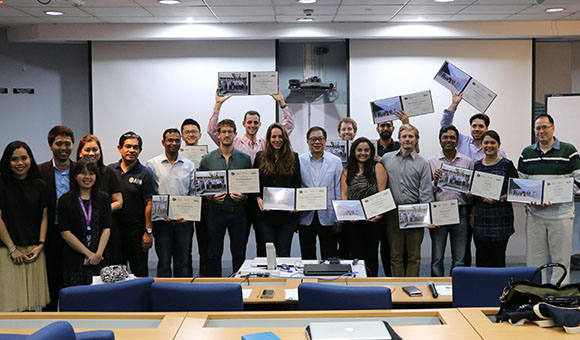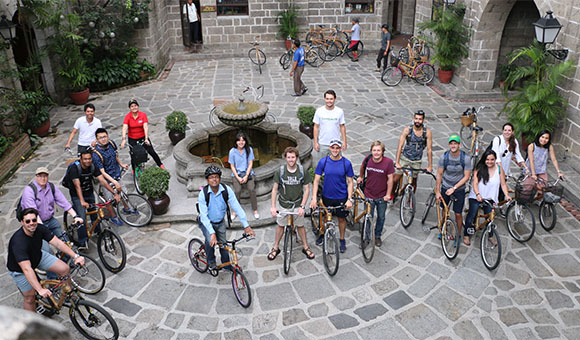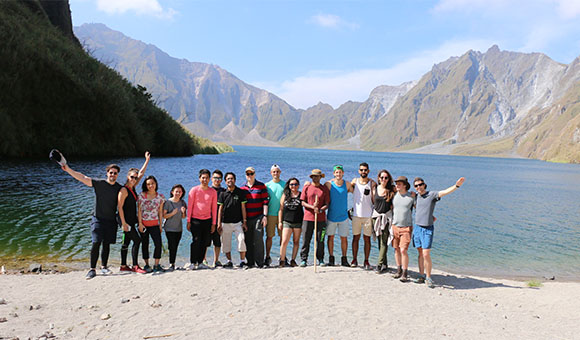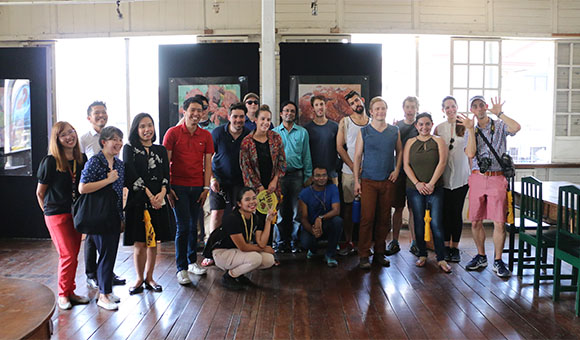Asian Institute of Management Philippines
Students from across the Global Network for Advanced Management traveled to the Philippines to attend AIM's Global Network Week module on sustainable tourism and social enterprises.
Day 5: March 17, 2017—Asian Institute of Management, Makati City
Day five focused on the presentation of the capstone projects. The students were separated into three groups with four members each. They presented their marketing plans, strategies, and policy recommendations to selected sites visited during the entire week to four panelists: Noel M. Cortez (head, AIM W.SyCip Graduate School of Business), Ofelia Odilao-Bisnar (vice chair, AIM Alumni Association), Afrecita D. Nieva (sales director, AIM Conference Center Manila), and Jesli A. Lapus (chair, AIM Dr. Andrew L. Tan Center for Tourism).

The students from the first group discussed the topic on the Pinatubo Business Plan, providing recommendations for marketing Mount Pinatubo as a prime geo-tourism destination in the Philippines. The students highlighted the idea of building up digital marketing, as well as including additional cultural tourism activities.
The second group presented a set of policy recommendations for Mount Pinatubo. Proposals recommended improving the sustainability of infrastructures, establishing a special tourism zone, promoting cultural activities, and improving the governance surrounding the tourism site.
The last group discussed promoting destinations through storytelling, specifically in the case of Mount Pinatubo. The students recommended offering a three-day tour package to promote cultural heritage and geological/adventure tourism, which would capitalize on the communities already existing culture and traditions.
At the end of the program, students were given certificates of completion. Post-program, they were brought to Balikbayan Handicrafts for their Philippine souvenirs.
Day 4: March 16, 2017—Intramuros, Manila

Sustainable social enterprises were explored during Day four of the GNW in the Philippines. The students learned about several business models from social enterprises including Bambike Revolution Cycles, Gawad Kalinga, and the Philippine Artisan Trade.
The morning session was spent in the Walled City of Intramuros, also known as Old Manila. Bryan Benitez McClelland, founder of Bambike Revolution Cycles, talked about the business model he employed in growing the social enterprise and making it sustainable. The short discussion was followed by a bicycle eco-tour around Intramuros, during which the students got to learn about the history of the Philippines.
The social entrepreneurship community in the Philippines became the focal point of the afternoon sessions. McClelland talked about the business model of the Gawad Kalinga enterprise and “the incubators.” The students were able to visit the showroom where products of the Philippine Artisan Trade are located.
Day 3: March 15, 2017—Mount Pinatubo Crater Lake

Day three of the GNW was spent at the Mount Pinatubo Crater Lake in the vicinity of the provinces of Pampanga, Tarlac, and Zambales. The on-site activity complemented the prior lectures focusing on the concept of geo-tourism in the country, specifically in Mount Pinatubo.
The students embarked on a whole day of hiking, by a 4x4 ride (courtesy of tour operator Allan Bognot) and by foot, to reach the Mount Pinatubo Crater Lake. Along the way, the students were able to explore the ecosystem and the rocks and minerals found along the trail. The students were treated to a scenic sight upon arrival at the top.
Day 2: March 14, 2017—Holy Angel University, Angeles City, Pampanga
Day two brought the students to the culinary capital of the Philippines: Pampanga. The students were hosted by the College of Hospitality and Tourism Management of Holy Angel University, where they got the opportunity to sample authentic Kapampangan cuisine. They were welcomed by Dr. Alma S. Espartinez, vice president for academic affairs and dean of graduate studies and research of Holy Angel University, and Dr. Gertrude P. Tuazon, dean of the College of Hospitality and Tourism Management.

The on-site discussions focused on Philippine culinary tourism. The discussion was facilitated by Saira Yap, chef instructor at the Holy Angel University, whose discussion revolved around Pampanga as the culinary capital of the Philippines and the popular dishes that contribute to the tourism industry in the province.
The students were given a walking heritage tour of Angeles in the afternoon. They had the opportunity to visit the following sites: the Pamintuan Mansion, Sto. Rosario Church, Museo Ning Angeles, Center for Kapampangan Studies (CKS), and the Mount Pinatubo Museum. The walking tour was facilitated by Princess Ann Anunciacion and Ian Bencio David of the Holy Angel University. The tour was conducted alongside discussions about the history of each of the sites visited.
Day 1: March 13, 2017—Asian Institute of Management, Makati City
Thirteen students from the Indian Institute of Management - Bangalore (India), EGADE Business School (Mexico), and the Yale School of Management (USA), Yale School of Forestry & Environmental Studies (USA), and the ICS Hitotsubashi University (Japan) were welcomed by Fernando Martin Y. Roxas, executive director of the AIM-Dr. Andrew L. Tan Center for Tourism.
Day one started with an introduction to Philippine tourism by Eylla Laire M. Gutierrez of the AIM-Dr. Andrew L. Tan Center for Tourism. The discussion provided an overview of the efforts leading to the success of the memes, videos, and advertisements of the “It’s More Fun in the Philippines” campaign by the Department of Tourism and how tourists were encouraged to visit the Philippines again through food and culture.
The discussion was followed by a lecture on sustainable tourism by Fernando Martin Y. Roxas. The triple bottom line strategy was used as a framework in understanding ecotourism as a form of sustainable tourism. According to Roxas, the global ecotourism market has been one of the fastest growing sectors of the tourism industry, with an estimated annual growth range of 5 to 50%. Given this growth rate, ecotourism has the capacity to create eight billion visits per year to protected areas. The reasons for this global ecotourism growth are: environmental awareness and interest, media exposure to natural areas, satisfaction with traditional tourism, and increased connectivity to ecotourism destinations.
Afterward, Carl Francis T. Castro, a licensed environmental planner and faculty member of La Consolation College and Lyceum University of the Philippines, gave a lecture on sustainable tourism in the Philippines and its neighboring ASEAN countries. Castro talked about sustainable tourism development and the challenges faced in pursuing it. According to Castro, sustainable tourism is achieved through “a balance between environmental, economic, and socio-cultural aspects of the industry.” Sustainable tourism development was placed in the context of the Philippines and ASEAN region, and updates on the current and future endeavors were given. The lecture concluded with recommendations that highlight the importance of involving governments, local community members, and tourism businesses in the pursuit of sustainable tourism development both nationally and in the larger ASEAN region.
Richard S. Aquino, lecturer at the Holy Angel University, tackled the topic of sustainable geo-tourism in the Philippines. The discussion revolved around geo-tourism as a concept, and geo-tourism in the context of the Philippines. The case of Mount Pinatubo as a geo-tourism site became the focal point of the discussion. Tourism development in the area was one of the consequences of the volcanic eruption, when involvement of the local community became significant in the management and governance of the site. The lecture concluded with a summary of the concept of geo-tourism and the practices that can be upheld to ensure the success of its continuous development.
Juliette Kwee, founder of World Experience Philippines, Department Tours & Training Desk, Smokey Tours, delivered the final lecture on the Smokey Tours enterprise in the Philippines and its alignment with the pursuit of sustainable development goals. Kwee provided an introduction to what the Smokey Tours is all about, specifically that it offers unique tours such as the slum tour, bicycle tour, market tour, and cemetery tour, all of which are taken by both locals and foreign visitors. The lecture concluded with a discussion on how these tours engage the local community, consequently contributing to the achievement of the larger sustainable development goals in the country.
